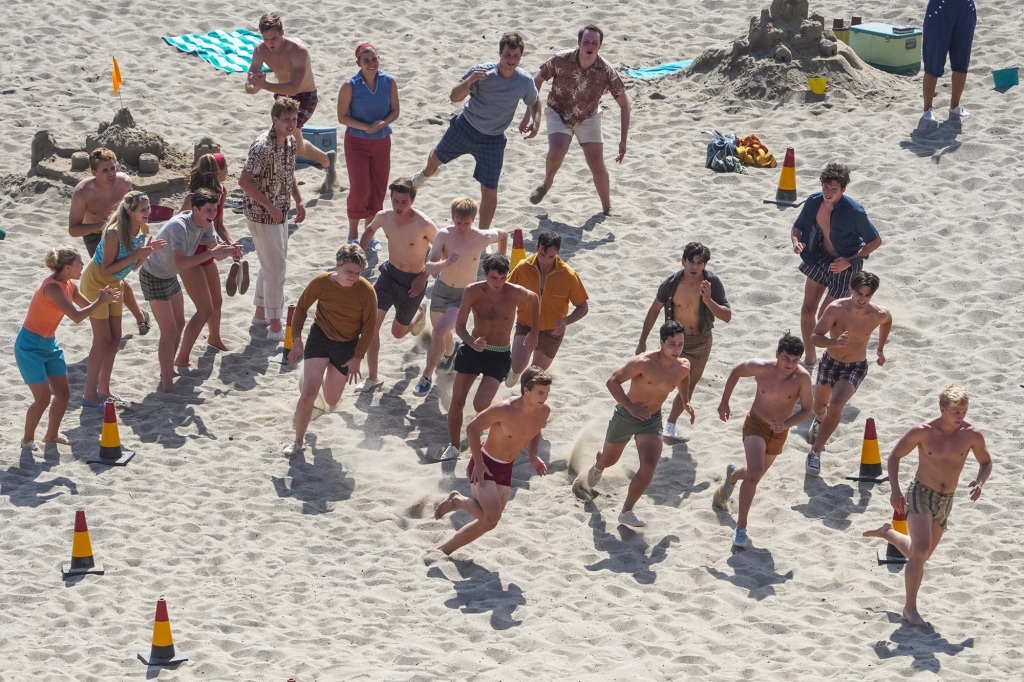Spielberg’s latest is the best of the year
The best movie of the year so far is Steven Spielberg’s extraordinary “The Fabelmans.”
It’s gripping, visually mesmeric, boasts an exceptional, grounded script by Tony Kushner and is acted to the hilt. A no-holds-barred Michelle Williams skyrockets to the front of the Oscar race with an unforgettable performance.
Spielberg’s deeply personal project, which had its world premiere Saturday night at the Toronto International Film Festival, has been shrouded in secrecy for months. About all we knew going in was that the movie is based on the famed director’s own life, and stars Williams, Paul Dano and Seth Rogen.
Running time: 151 minutes. Rated PG-13 (some strong language, thematic elements, brief violence and drug use.)
But “The Fabelmans” is so much richer and less predictable than any run-of-the-mill, point-A-to-point-B biopic, even though we know that the ending is, well, “Jaws.”
There is a palpable feeling throughout that unlike the director’s recent, capable films like “West Side Story” or “The Post,” Spielberg needed to make this one. That he’s had this idea and these raw feelings lying dormant for decades. That otherwise he might explode.
The thrilling result of his behind-the-camera therapy is some of the director’s finest work in years, and a movie that feels, for the first time in forever, like a bona fide Spielberg film.
The searing image of a gobsmacked little boy projecting an early short film onto his hand is one I won’t soon forget.
That little screen stand-in for Spielberg is lSammy Fabelman (Mateo Zoryon Francis-DeFord), whose mom Mitzi (Williams) and dad Burt (Dano) take to his first movie, Cecil B. DeMille’s “The Greatest Show On Earth.” Floored, Sammy recreates the film’s crash scene with his own train set at his New Jersey house and mom encourages him to film it — unleashing an obsession with Hollywood and movie-making.
This is not a narcissistic film, though. As the title would suggest, the story is very much about the whole family. The Fabelmans move around for quiet Burt’s job as a computer programmer, and first they head to Arizona. They are joined, somewhat strangely, by Burt’s best friend Benny (Rogen).
Despite the childhood difficulty of changing cities, the desert dust and rocks gives now-teenage Sammy (Gabriel LaBelle) a playground to shoot ambitious Westerns and battle scenes.
There’s a battle raging at home, too. Mitzi feels restless and out-of-place, and while making one of his short films, Sammy sees something disturbing in the editing room that changes his life. It reminded me, sans murder, of Brian DePalma’s “Blow Out.”

What’s striking about Spielberg’s memory movie is that, unlike say Eugene O’Neill’s “Long Day’s Journey Into Night,” everybody is treated with such warmth and compassion. The director empathizes with all of his character. The only villain, per se, is an anti-Semitic high school classmate of Sammy’s later on in California. (All the coming-of-age, John Hughes-y business is a scream.)
LaBelle, who’s mostly played small roles till now, is a stunning find with a big future. He so tenderly embodies this quirky introvert who channels his angst into his art, until it boils over. Spielberg is known for the very real performances he can wrestle out of young people. So, you can imagine the magic he can do with a version of his teen self.
There is also an uproarious cameo appearance from Judd Hirsch as visiting Uncle Boris, who over the course of an evening, teaches Sammy the sacrifices he’ll need to make to score a life in showbiz. He’s hysterical.
The other quick hello that will have folks talking is David Lynch. I won’t say what he does. But holy moly. Twitter will tell ya soon enough.
But the movie belongs to Williams, who brings the same “what will she do next?!” energy that set fire to the screen in “Manchester By The Sea” and “Fosse/Verdon.” Hers is a great big performance in a movie that, while simple, is undoubtedly stylized. Williams turns domestic struggles into something grand and universal.
It’s been in-Vogue lately for directors to make self-reflective movies. Alfonso Cuaron had “Roma,” Kenneth Branagh made “Belfast” and Alejandro Inarritu just premiered his “Bardo” in Venice. Yet it’s Spielberg’s that has hit me the hardest.
How profound to say that the road to killer sharks, alien house guests, T-Rexes and World War II epics begins and ends with mom and dad.
Read the full article Here


